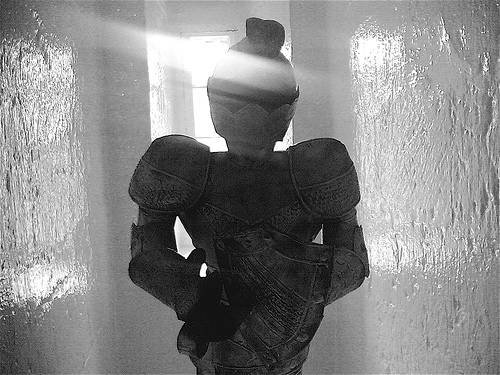We run our website the way we wished the whole internet worked: we provide high quality original content with no ads. We are funded solely by your direct support. Please consider supporting this project.

Put on the Armor of God
The whole of the Christian life is an act of war against the enemy as we follow Jesus in storming the gates of hell (See post.) No passage better illustrates this than Paul’s metaphor of spiritual armor from Ephesians 6. He writes that Christians are to “be strong in the Lord and in the strength of his power” which means putting on “the whole armor of God, so that you may be able to stand against the wiles of the devil, … against the rulers, against the authorities, against the cosmic powers of this present darkness, against the spiritual forces of evil in the heavenly places” (Eph 6:10-12).
For this reason, “truth,” “righteousness,” “the gospel of peace,” “salvation” and the “word of God” are all portrayed as various aspect of the “whole armor of God” used by Christians to ward off demonic attacks (Eph 6:14-17). Paul associates each with a different piece of armor in this way:
- The belt of truth
- The breastplate of righteousness
- Feet fitted with the gospel of peace
- Helmet of salvation
- Sword of the Spirit which is the word of God
In addition, faith itself is portrayed as a “shield” by which we “quench all the flaming arrows of the evil one” (6:16).
With all of this armor, Christians are to “stand firm.” The first charge is to “hold your ground against” an assailing force, while the second is to be ever watchful of an ever-present enemy. The battle motif here is thick, one that pervades the whole of the Christian life.
While Paul does not specifically mention prayer as part of the Christian’s armor, in this context it is most certainly seen as a warfare strategy, just as it was in the teachings of Jesus. Immediately after mentioning “the word of God” as the “sword of the Spirit” Paul adds “Pray in the Spirit at all times in every prayer and supplication” (6:18). Then he adds, “To that end keep alert and always persevere in supplication for all the saints.”
The injunction to “keep alert” while we pray is a clear indication that prayer is here portrayed as something a soldier does. It is, in short, an act of war.
This war motif is common in Paul’s writings. He tells Timothy to “share in suffering like a good soldier of Christ Jesus” and reminds him that “no one serving in the army gets entangled in everyday affairs; the soldier’s aim is to please the enlisting officer” (2 Tim 2:3-4). He writes of “fighting the good fight” (1 Tim 1:18; 6:12), about “waging war” (2 Cor 10:3), and charges us to “lay aside the works of darkness and put on the armor of light” (Rom 13:12).
For too long, the church has viewed this war motif as being incidental to the New Testament. Whether the motivation be to minimize the “mythological” elements of the NT or to maximize the classical model of God’s control by downplaying this battle language, we must recognize that the warfare motif is central. God’s conflict and victory over Satan lies at the heart of the Gospel and shapes what it means to be a follower of Jesus in this fallen world.
—Adapted form God at War, pages 281-283
Photo credit: wili_hybrid via Visual hunt / CC BY-NC
Category: General
Tags: Faith, Kingdom Living, Prayer, Satan, Warfare Worldview
Related Reading

Our Insatiable Hunger
The only kind of life animals care about is biological. If their basic physical needs for food and shelter are met, they’re satisfied. Humans also want their basic physical needs met, of course, but that isn’t enough. We hunger for more. Not only do we want to be alive, we want to feel fully alive.…

How Should We Respond to Bullies?
Greg answers a question from parents as to how their child should respond to a bully.

War in the Heavens!
What does spiritual warfare look like from the perspective of the physical world? Our friend David D. Flowers speculated on that question in a post he entitled Dark Matter vs Dark Energy: War in the Heavens. Referencing Greg’s Satan and the Problem of Evil, David considers the possibility that the interaction between dark matter and dark energy that…

What Type of Faith Do You Have?
Genesis 32 tells the story of Jacob, wrestling through the night with a nameless man, revealed to be none other than God Himself. We read that when this man “saw that he could not overpower” Jacob, he “touched the socket of Jacob’s hip so that his hip was wrenched as he wrestled with the man”…

Interview with Drew Marshall
Greg was interviewed by Drew Marshall on Saturday, November 2, on the topic of his new book Benefit of the Doubt, and we thought you might like to listen to what he had to say. You can find the interview here. Enjoy!

What are the main principles of the warfare worldview?
In my book God At War (IVP, 1997) I flesh out what I call the “warfare worldview” of the Bible. This is the view that the world is a battle ground between God and good angels, on the one hand, and Satan and fallen angels, on the other. In my book Satan and the Problem…
